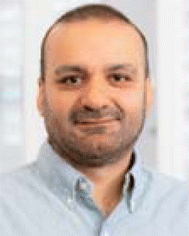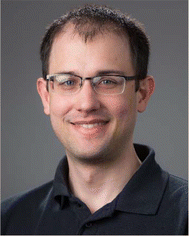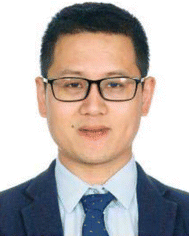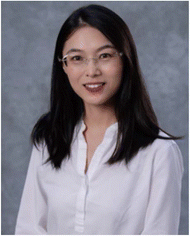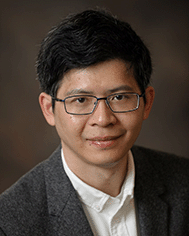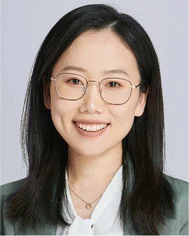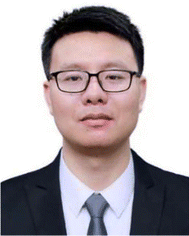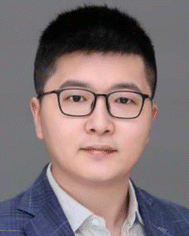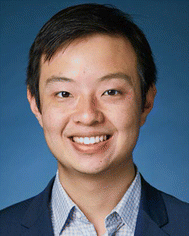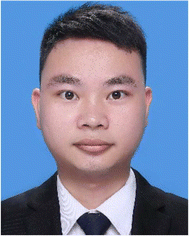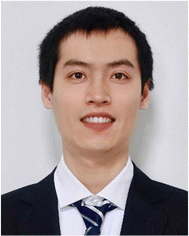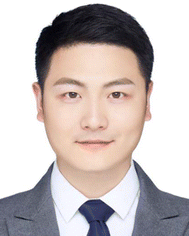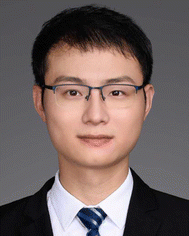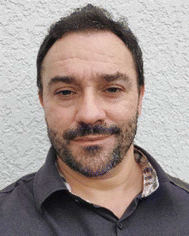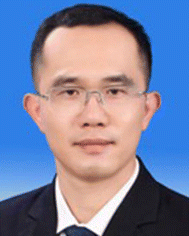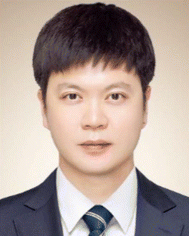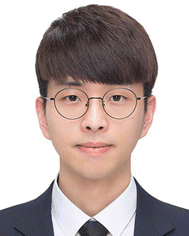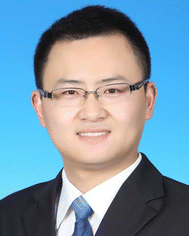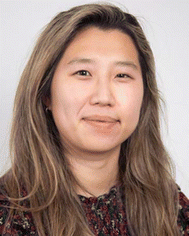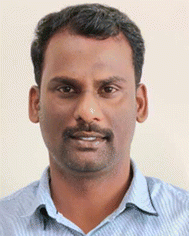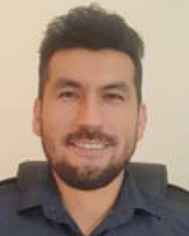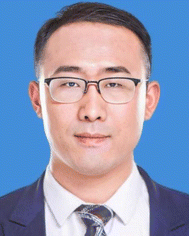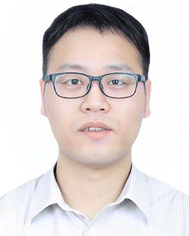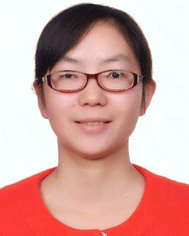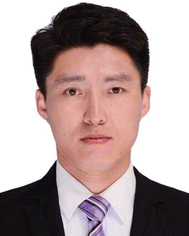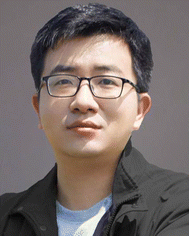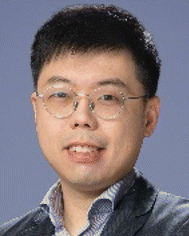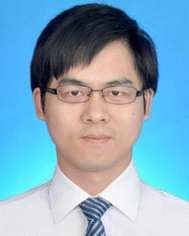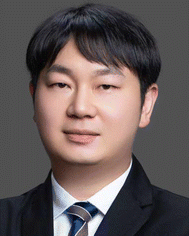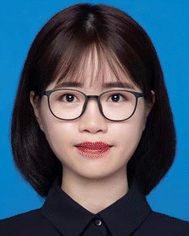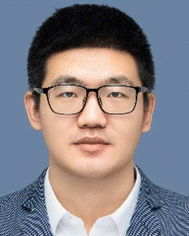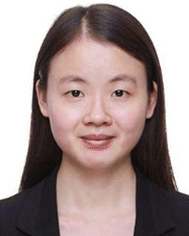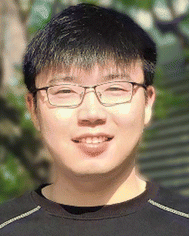DOI:
10.1039/D5NR90099A
(Profile)
Nanoscale, 2025, Advance Article
Nanoscale profiles: contributors to the 2025 Emerging Investigators collection
Abstract
This profile gathers together the biographies of our 2025 Emerging Investigators, exceptional nanoscientists in the early stages of their independent career. Congratulations to all of the researchers featured, find out more about them below.
Wei Ai received his PhD and MS degree from Nanyang Technological University and Nanjing University of Posts and Telecommunications, respectively. After working as a research associate at Nanyang Technological University, he joined the Institute of Flexible Electronics at Northwestern Polytechnical University. His research interests focus on electrochemical materials and technologies, new energy devices, flexible intelligence technologies, etc.
Their contribution to the 2025 Nanoscale Emerging Investigators collection can be read at https://doi.org/10.1039/D4NR02963A.
Behnam Akhavan is an Australian Research Council (ARC) DECRA Fellow and an associate professor of biomedical engineering at the University of Newcastle, Australia. He leads the Plasma Bio-engineering Laboratory at the School of Engineering and the Hunter Medical Research Institute (HMRI). Since obtaining his PhD in Advanced Manufacturing from the University of South Australia in 2015, he has held postdoctoral and academic positions at the Max Planck Institute for Polymer Research and Fraunhofer Institute of Microtechnology in Germany, and the University of Sydney. Akhavan's pioneering work in plasma bio-engineering, published in over 90 journal articles, has led to innovative applications in healthcare and beyond. He is recognised by Engineers Australia as one of the nation's Most Innovative Engineers.
Their contribution to the 2025 Nanoscale Emerging Investigators collection can be read at https://doi.org/10.1039/D5NR00436E.
Christian Aponte-Rivera is an assistant professor in the Department of Chemistry at Stony Brook University. He received his BS in chemical engineering from the University of Puerto Rico, Mayagüez and PhD in chemical and biomolecular engineering from Cornell University. He was a postdoctoral researcher in the Department of Mechanical Engineering and Materials Science at Duke University, after which he joined Stony Brook University as an IDEA Fellow. His research focuses on using scattering experiments, simulations and theory of soft materials to answer fundamental questions with applications in neurodegenerative disease pathology, nanomaterial design, and energy. His work has been recognized through awards such as the ACS PRF Doctoral New Investigator award.
Their contribution to the 2025 Nanoscale Emerging Investigators collection can be read at https://doi.org/10.1039/D4NR04045G.
Ingrid David Barcelos is an early-career scientist specializing in nanomaterials and optoelectronic devices, with a focus on polaritonic systems and their applications in THz and MIR technologies. She currently leads the Microscopic Sample Laboratory at the Brazilian Synchrotron Light Laboratory (LNLS), where she develops innovative approaches to explore the optical properties of 2D materials, such as semiconductor oxides and natural phyllosilicates, using advanced techniques like synchrotron infrared nanospectroscopy and s-SNOM. Recently recognized with the B-MRS Early Career Woman Scientist Prize, Barcelos is also an Affiliate Member of the Brazilian Academy of Sciences (2025–2029). She is committed to advancing the understanding of low-dimensional materials while promoting diversity and inclusion in science.
Their contribution to the 2025 Nanoscale Emerging Investigators collection can be read at https://doi.org/10.1039/D4NR04532G.
Nikhil Bhalla is currently working as a lecturer (assistant professor), at the University of Ulster, UK. His research interest is in biosensing with a prime focus on nanoplasmonic technologies and interfacial science of biosensing materials, transducers, and biorecognition layers. He focuses on the use of his developed sensors for healthcare and food applications. He did his postdoctoral training at OIST, Japan, with Professor Amy Shen after receiving his PhD from the University of Bath, UK, in 2016, MS in microelectronics and applications from CYCU, Taiwan, and a first division honours degree (BE Hons) in electronics and instrumentation engineering from BITS-Pilani, India.
Their contribution to the 2025 Nanoscale Emerging Investigators collection can be read at https://doi.org/10.1039/D4NR04993D.
Natalie Boehnke received her PhD in organic chemistry from UCLA in 2017. After completing a postdoc at the Koch Institute for Integrative Cancer Research at MIT, which focused on engineering targeted nanomaterials for drug delivery applications, she joined the Chemical Engineering and Materials Science Department at the University of Minnesota as an assistant professor in 2022. Boehnke's current research interests are inspired by her multidisciplinary background, focusing on next-generation tools to advance nanomedicine. Specifically, her group takes a data driven approach to nanocarrier design, developing barcoded and pooled screening approaches and leveraging bioactive building blocks to develop intrinsically therapeutic drug delivery systems.
Their contribution to the 2025 Nanoscale Emerging Investigators collection can be read at https://doi.org/10.1039/D4NR04508D.
Paolo Bollella is an expert in electrochemical biosensors based on bio-nanomaterials. He earned his BSc (2012) and MSc (2014) degrees in analytical chemistry at Sapienza University of Rome and a PhD (2017) in pharmaceutical sciences. He worked at Clarkson University (USA) and became a research assistant professor in 2019. Since 2020, he has been at the University of Bari Aldo Moro, becoming a tenure track assistant professor in 2023. Being an author of 110 publications (H-index 34), he has received multiple awards and leads major research projects. He is an advisor at DirectSens and among the top 2% most influential scientists (Stanford ranking).
Their contribution to the 2025 Nanoscale Emerging Investigators collection can be read at https://doi.org/10.1039/D4NR04857A.
Changyong (Chase) Cao is an assistant professor in the Department of Mechanical and Aerospace Engineering, and Electrical, Computer, and Systems Engineering at Case Western Reserve University (CWRU). He also serves as an Investigator at the Advanced Platform Technology (APT) Center of the Louis Stokes Cleveland VA Medical Center. Cao earned his PhD in mechanical engineering and materials science from the Australian National University and completed postdoctoral training at Duke University. His research focuses on flexible and stretchable electronics, soft robotics, energy harvesting and storage, multifunctional materials, and 3D/4D printing.
Their contribution to the 2025 Nanoscale Emerging Investigators collection can be read at https://doi.org/10.1039/D4NR04583A.
Biswarup Chakraborty is currently an associate professor at the Department of Chemistry, Indian Institute of Technology Delhi (IIT Delhi), India, and his research group works on inorganic materials design for photo(electro)catalytic applications, focusing on the structure–activity correlation and establishing the reaction pathway. He did his PhD in inorganic chemistry at the Indian Association for the Cultivation of Science (IACS), India, and completed it in 2014. He then moved to Ben-Gurion University of the Negev, Israel, for postdoctoral research. Before joining IIT Delhi, he spent more than a year as a postdoctoral fellow at the Technical University of Berlin, Germany.
Their contribution to the 2025 Nanoscale Emerging Investigators collection can be read at https://doi.org/10.1039/D4NR03107E.
André J. Chaves is a professor at the Aeronautics Institute of Technology (ITA). Chaves holds a Bachelor's degree in electronic engineering and a Master's degree in physics from ITA, as well as a PhD in physics from the University of Minho. He has been a visiting researcher at the International Iberian Nanotechnology Laboratory (INL) and the Center for Polariton-driven Light–Matter Interactions (POLIMA) at the University of Southern Denmark (SDU). As a condensed matter physics theorist, Chaves's main interest is the optical properties of two-dimensional (2D) materials, focusing on plasmons and excitons.
Their contribution to the 2025 Nanoscale Emerging Investigators collection can be read at https://doi.org/10.1039/D4NR04532G.
Bo Chen received his BS degree, MS degree, and PhD from Lanzhou University (2009), Shandong University (2012), and Nanyang Technological University (2017), respectively. Then, he worked as a research fellow at Nanyang Technological University (2017–2020) before moving to the City University of Hong Kong as a research associate (2020–2023). Currently, he is a professor at the School of Chemistry and Life Sciences, Nanjing University of Posts and Telecommunications. His current research interests include the synthesis, characterization, and applications of nanomaterials with unconventional phases.
Their contribution to the 2025 Nanoscale Emerging Investigators collection can be read at https://doi.org/10.1039/D4NR05510A.
Hongyu Chen received her PhD from the Changchun Institute of Optics, Fine Mechanics and Physics, Chinese Academy of Sciences, in 2014. Afterward, she worked as a postdoctoral fellow in the Department of Materials Science, Fudan University, China. Since then, she has worked as a lecturer in the Department of Physics, Harbin Institute of Technology, China. Currently, she is an associate professor at the School of Electronic Science and Engineering (School of Microelectronics), South China Normal University, China. Her current research interests include the design, fabrication, and exploration of novel properties of optoelectronic devices based on semiconductor and metallic materials, with a special focus on low-dimensional photodetectors.
Their contribution to the 2025 Nanoscale Emerging Investigators collection can be read at https://doi.org/10.1039/D4NR05034G.
Han-Hee Cho studied at the Korea Advanced Institute of Science and Technology (KAIST) where he completed a PhD in 2017 under the supervision of Prof. Bumjoon J. Kim. He then joined the Laboratory for Molecular Engineering of Optoelectronic Nanomaterials (LIMNO, led by Prof. Kevin Sivula) at École Polytechnique Fédérale de Lausanne (EPFL) as a postdoctoral researcher. He has cultivated his research career in the field of solar energy conversion using organic semiconductors and currently he is an assistant professor of Materials Science and Engineering at Ulsan National Institute of Science and Technology (UNIST). His research interests include organic semiconductor-based photoelectrochemical cells and photocatalysts for solar fuel production.
Their contribution to the 2025 Nanoscale Emerging Investigators collection can be read at https://doi.org/10.1039/D4NR03938F.
Soo-Yeon Cho is an associate professor of Chemical Engineering at Sungkyunkwan University (SKKU). He received his BS degree and PhD in chemical engineering from KAIST in 2019. He was a postdoctoral associate at MIT (2019–2022) and a visiting scholar at UC Berkeley (2016). Cho received the Innovator Under 35 Asia Pacific (TR35) award from MIT Technology Review in 2023 and the Rising Star in Measurement Science award from ACS in 2024. His research focuses on developing advanced chemical and biological sensor systems for innovative analytical platforms that support smart chemical production and precision medicine.
Their contribution to the 2025 Nanoscale Emerging Investigators collection can be read at https://doi.org/10.1039/D4NR05046K.
Miryam Criado-Gonzalez is a Ramón y Cajal assistant researcher at the Institute of Polymer Science and Technology (CSIC), Spain. She leads a research team studying smart polymeric and polypeptide materials for biomedical applications. Her research interests include the synthesis of bio-based functional polymers and polypeptides and the study of their self-assembly, as well as the development of intelligent nanomaterials and gels and their additive manufacturing processes through 3D/4D printing technologies for advanced applications in the biomedical field. She received the Young Researcher Award from the European Materials Research Society (E-MRS) in 2021 and the Emakiker researcher position at POLYMAT in 2022.
Their contribution to the 2025 Nanoscale Emerging Investigators collection can be read at https://doi.org/10.1039/D5NR00027K.
Jiabin Cui received his PhD from the Beijing University of Chemical Technology. He has been working with Prof. Uri Banin as a postdoctoral fellow at the Hebrew University of Jerusalem in Israel since 2017. He joined the School of Radiation Medicine and Protection at Soochow University in 2021. His research focuses on coupled nanocrystal molecules, fluorescent nanoprobes, and new applications in sensors, cancer therapy, and molecular imaging. To date, he has published over 40 papers in journals, such as
Nat. Commun.,
J. Am. Chem. Soc.,
Angew. Chem., Int. Ed.,
Adv. Mater.,
Acc. Chem. Res.,
Nano Lett.,
Anal. Chem. and so on.
Their contribution to the 2025 Nanoscale Emerging Investigators collection can be read at https://doi.org/10.1039/D4NR04835K.
Haoyu Dai is currently an associate professor at the Technical Institute of Physics and Chemistry, Chinese Academy of Sciences. He received his BSc degree (2015) from Tsinghua University and his PhD (2020) from Peking University, where he was supervised by Prof. Lei Jiang. His research interests focus on liquid dynamics at interfaces with super-wettability, including the development of super-wetting materials, electrically controlled liquid transport, and plasma-induced surface functionalization, with a focus on their industrial applications.
Their contribution to the 2025 Nanoscale Emerging Investigators collection can be read at https://doi.org/10.1039/D4NR04457F.
Weiji Dai received his PhD from Southeast University in 2021. He is currently a lecturer at the School of Materials Science and Engineering, Jiangsu University of Science and Technology. His research interests are mainly focused on the synthesis, functionalization, catalytic mechanism, and applications of metastable materials (
e.g. amorphous and high-entropy materials).
Their contribution to the 2025 Nanoscale Emerging Investigators collection can be read at https://doi.org/10.1039/D4NR04342A.
Anindita Das received her MSc in chemistry from the University of Calcutta (2009) and her PhD from the Indian Association for the Cultivation of Science (IACS), India (2014), under the mentorship of Prof. Suhrit Ghosh. She then pursued postdoctoral research as an Alexander von Humboldt Fellow with Prof. Patrick Theato at the University of Hamburg, Germany, and later, worked with Prof. E.W. Meijer at the Eindhoven University of Technology, Netherlands. In 2017, she joined IACS, where currently she holds an associate professor position. Her research interests include precision (macro)molecular assemblies employing halogen bonding, supramolecular polymers, crystallization-driven polymer assemblies, and biodegradable polymers.
Their contribution to the 2025 Nanoscale Emerging Investigators collection can be read at https://doi.org/10.1039/D4NR04696J.
Sili Deng is the Class of 1954 Career Development Associate Professor in Mechanical Engineering at Massachusetts Institute of Technology. She received her doctoral degree in Mechanical and Aerospace Engineering from Princeton University and postdoctoral training at Stanford University in Mechanical Engineering. She joined MIT as an assistant professor in 2019. Her research focuses on energy conversion and storage, specifically, the fundamental understanding of combustion and emissions, physics-informed data-driven modeling of reacting flows, carbon-neutral energetic materials, and flame synthesis of materials for catalysis and energy storage.
Their contribution to the 2025 Nanoscale Emerging Investigators collection can be read at https://doi.org/10.1039/D4NR05487C.
Jun Di received his BS degree (2012) and PhD (2018) from Jiangsu University. He then carried out postdoctoral research (2018–2022) at Nanyang Technological University with Prof. Zheng Liu. He is currently a professor at Nanjing University of Science and Technology and selected as a national overseas high-level young talent. He is the first or corresponding author of more than 80 peer-reviewed scientific papers published in
Nat. Commun.,
Coord. Chem. Rev.,
Adv. Mater.,
Angew. Chem., Int. Ed.,
Mater. Today,
etc., with over 15
![[thin space (1/6-em)]](https://www.rsc.org/images/entities/char_2009.gif)
000 citations and H-index 66. His research interests focus on the design of 2D materials for photocatalytic energy conversion.
Their contribution to the 2025 Nanoscale Emerging Investigators collection can be read at https://doi.org/10.1039/D4NR03787A.
Yuxiao Ding received his PhD from the Institute of Metal Research, Chinese Academy of Sciences (China) in 2015. Thereafter, he joined the Max Planck Institute for Chemical Energy Conversion (Germany) as a postdoc researcher until he became a professor and started a new research team in 2021 at the Lanzhou Institute of Chemical Physics, Chinese Academy of Sciences. His research interests focus on carbon surface chemistry and related applications in catalysis and energy-associated areas.
Their contribution to the 2025 Nanoscale Emerging Investigators collection can be read at https://doi.org/10.1039/D4NR04225E.
Weiliang Dong obtained his PhD in microbiology from Nanjing Agricultural University, China. He serves as Dean of the New Rural Development Research Institute and Deputy Director of the Key Laboratory for Biocatalytic Depolymerization and Recycling of Waste Plastics. He is a recipient of the Jiangsu Provincial Excellent Youth Fund and a candidate for Jiangsu's “333 high-level talents” program. His research focuses on microbial and enzyme technologies for solid waste resource utilization and the synthesis of high value-added products.
Their contribution to the 2025 Nanoscale Emerging Investigators collection can be read at https://doi.org/10.1039/D4NR03404J.
Ke Du is an assistant professor of chemical and environmental engineering at the University of California, Riverside. His research interests include
in vitro molecular diagnostics,
in vivo bioimaging, nanotoxicity, and nanomanufacturing. He is recipient of numerous awards and honors such as the EIPBN Inaugural Early Career Award (2024), the NIH Maximizing Investigators’ Research Award (2021), the Burroughs Wellcome Fund (BWF) Collaborative Travel Grant (2019), and the James H. Potter Award for outstanding PhD students (2014). Currently, Du serves as an early career editorial advisory member for
Biomicrofluidics (AIP Publishing) and
Sensors and Actuators Reports (Elsevier).
Their contribution to the 2025 Nanoscale Emerging Investigators collection can be read at https://doi.org/10.1039/D4NR03142C.
Zhonglin Du received his PhD from the East China University of Science and Technology (ECUST). He was awarded the International Postdoctoral Exchange Fellowship Program of the China Postdoctoral Council at the Institut National de la Recherche Scientifique (INRS) of Canada. Currently, he is an associate professor at the National Center of International Joint Research for Hybrid Materials Technology of Qingdao University. His main research interests include semiconductor quantum dot synthesis and their optoelectronic device applications, such as solar cells and photodetectors.
Their contribution to the 2025 Nanoscale Emerging Investigators collection can be read at https://doi.org/10.1039/D4NR04410J.
Leeya Engel is an Assistant Professor of Mechanical Engineering and a Glazer Foundation Faculty Fellow at the Technion – Israel Institute of Technology. She holds a B.Sc. in physics from The Hebrew University of Jerusalem and a Ph.D. in materials engineering and nanotechnologies from Tel Aviv University. Her research on electroactive polymer micro-actuators was recognized by the Nellie Yeoh Whetten Graduate Student Award (AVS). As a ChEM-H Postdoctoral Fellow at Stanford University, Leeya developed micropatterning technologies for applying cryo-EM to cells. Her current research bridges nanofabrication, mechanobiology, and electron microscopy to study nanoscale biological structures and the mechanics that shape them.
Their contribution to the 2025 Nanoscale Emerging Investigators collection can be read at https://doi.org/10.1039/D4NR05508J.
Bei Fan received her PhD in mechanical engineering from the University of California San Diego in 2019 and completed her postdoc at Lawrence Berkeley National Laboratory in 2021. Then, she joined Mechanical Engineering at Michigan State University in 2021. Her research interests cover broad areas including thermal fluid science, microfluidic devices, electrokinetics, energy conversion and harvesting, desalination, and micro/nano-fabrication. Her work has been published in high-reputation journals such as
Science Advances,
Nature Communications,
Langmuir and Applied Physics Letters and reported by public media including
Science Daily,
Phys.org,
Physics Today,
etc. She has been awarded with NSF grant awards.
Their contribution to the 2025 Nanoscale Emerging Investigators collection can be read at https://doi.org/10.1039/D4NR04507F.
Huapan Fang obtained his PhD from the Changchun Institute of Applied Chemistry, Chinese Academy of Sciences in 2019. From 2020 to 2022, he conducted postdoctoral research at Soochow University. In December 2022, he joined the College of Chemistry and Chemical Engineering, Xiamen University. His research topics include biomedical polymers, biomaterials, polymer nucleic acid/drug carriers, tumor immunotherapy, and protein/peptide delivery.
Their contribution to the 2025 Nanoscale Emerging Investigators collection can be read at https://doi.org/10.1039/D4NR04481A.
Igor Fedin is an assistant professor in the Department of Chemistry and Biochemistry at The University of Alabama. He received his BS in chemistry from Kyiv National University in 2009, MS in physics from the University of Akron in 2011, and PhD in chemistry from the University of Chicago in 2017. He was a postdoctoral research associate at Los Alamos National Laboratory in 2017–2020. His research at UA focuses on bright, fast, durable short-wave infrared (SWIR) emitters for telecom applications.
Their contribution to the 2025 Nanoscale Emerging Investigators collection can be read at https://doi.org/10.1039/D5NR000002E.
Desheng Feng is a postdoctoral research fellow in the Department of Chemical Engineering at the University of Melbourne, Australia. He completed his Bachelor of Engineering in the School of Chemical Engineering (2019) and PhD (2024) from the University of Queensland. His current research focuses on the development of electrode materials and electrochemical processes for energy conversion.
Their contribution to the 2025 Nanoscale Emerging Investigators collection can be read at https://doi.org/10.1039/D4NR05513F.
Jie Feng is an assistant professor in the Department of Mechanical Science & Engineering at the University of Illinois Urbana-Champaign. He received his BS from Tsinghua University and his PhD in Mechanical & Aerospace Engineering from Princeton University. He completed his postdoctoral research in Chemical & Biological Engineering at Princeton University before joining the University of Illinois. His research focuses on understanding microscale transport phenomena in complex fluids, and leveraging these insights to address some of the challenging problems in energy, the environment, and healthcare. He was recognized as an Emerging Investigator by
Soft Matter,
RSC Advances and
Nanoscale.
Their contribution to the 2025 Nanoscale Emerging Investigators collection can be read at https://doi.org/10.1039/D5NR00942A.
Jingjie Ge is an assistant professor in the Department of Applied Biology and Chemical Technology at The Hong Kong Polytechnic University. She received her PhD from the University of Science and Technology of China (USTC) in 2018. She then worked as a Postdoctoral Fellow and Research Assistant Professor at Nanyang Technological University and The Hong Kong University of Science and Technology, respectively. Her current research interests focus on the atomic-level design of nanocatalysts and nanozymes for green chemistry and biology applications.
Their contribution to the 2025 Nanoscale Emerging Investigators collection can be read at https://doi.org/10.1039/D5NR00880H.
Guillermo González-Rubio studied chemistry at Complutense University (UCM) of Madrid, earning his PhD in 2017 under Prof. Luis Liz-Marzán and Prof. Andrés Guerrero-Martínez. He completed postdoctoral studies at the University of Konstanz with Prof. Helmut Cölfen, supported by an Alexander von Humboldt Foundation Fellowship. Since 2023, he has been an Atracción de Talento Research Fellow at UCM and was recently awarded an ERC Starting Grant to develop advanced methods for synthesizing complex multielemental nanocrystals. His research focuses on designing functional surface ligands and utilizing ultrafast pulsed laser irradiation for synthesizing, stabilizing, and assembling high-quality nanocrystals for optical and catalytic applications.
Their contribution to the 2025 Nanoscale Emerging Investigators collection can be read at https://doi.org/10.1039/D4NR04898A.
Eirini Goudeli has a Diploma in chemical engineering from the University of Patras, Greece (2012) and a PhD from ETH Zurich, Switzerland (2016). Since 2018, she has been a senior lecturer of chemical engineering at The University of Melbourne, Australia. Her research focuses on multiscale modeling of aerosol reactors and gas-phase synthesis of nanoparticles with energy applications.
Their contribution to the 2025 Nanoscale Emerging Investigators collection can be read at https://doi.org/10.1039/D4NR05199H.
Zhen Gu is a lecturer at the University of Science and Technology Beijing (USTB) and a visiting scholar at the National University of Singapore. He received his PhD from the Chinese Academy of Sciences and specializes in biointerface-based intelligent hydrogels for applications such as smart dressings and biomimetic microneedles. Gu has published over 40 SCI-indexed papers, including in
Adv. Mater. and
Sci. Adv., with 1700 citations and an H-index of 20. Recognized for his mentorship, he has received multiple awards and led over 10 research projects. His work has been featured in
Science Net and
Advanced Science News.
Their contribution to the 2025 Nanoscale Emerging Investigators collection can be read at https://doi.org/10.1039/D4NR05506C.
Ido Hadar is an assistant professor in the Institute of Chemistry at the Hebrew University of Jerusalem, Israel. He received his PhD (2016) from the Hebrew University under the guidance of Prof. Uri Banin, studying the effects of dimensionality on the optical properties of semiconductor nanocrystals. He then joined the group of Prof. Mercouri Kanatzidis at Northwestern University (2016–2020) as a post-doctoral researcher studying semiconductor materials for energy conversion, light emission, and radiation detection. Hadar's lab studies novel soft semiconductor materials with specific interest in structure–property correlations and structural dynamics in the excited state.
Their contribution to the 2025 Nanoscale Emerging Investigators collection can be read at https://doi.org/10.1039/D4NR05516K.
Fei Han received his Master's degree from the University of Science and Technology of China in 2018 and his PhD from Fudan University in 2021. In the same year, he joined the Shenzhen Institutes of Advanced Technology, Chinese Academy of Sciences, as a postdoctoral researcher. After completing his postdoctoral program in 2023, he transitioned to the role of assistant professor and was promoted to associate professor in 2024. Han's research focuses on developing multifunctional stretchable electrodes and sensors for wearable and implantable biomedical engineering applications.
Their contribution to the 2025 Nanoscale Emerging Investigators collection can be read at https://doi.org/10.1039/D4NR04542D.
Abhijit Hazarika received his PhD in chemical science from the Indian Institute of Science, Bangalore in 2015. He then moved to the University of Chicago to carry out research as a post-doctoral scholar (2015–2017). He also worked as a post-doctoral researcher at NREL, Colorado, from 2017–2019. He joined the CSIR-Indian Institute of Chemical Technology, Hyderabad, as a scientist in September 2019. His research interests are in the area of colloidal inorganic semiconducting nanomaterials, their synthesis, surface chemistry and photophysics. His current research focuses are on metal halide perovskite solar cells and colloidal quantum materials for optoelectronic applications.
Their contribution to the 2025 Nanoscale Emerging Investigators collection can be read at https://doi.org/10.1039/D4NR03422H.
Shohreh Hemmati is an assistant professor of chemistry at the University of Southern Mississippi (USM). Prior to this position, she served as an assistant professor of chemical engineering at Oklahoma State University (OSU) from 2018 to 2024. Before joining OSU, she was a postdoctoral researcher at Purdue University. Hemmati earned her PhD in chemical engineering from the University of New Hampshire in 2016. She holds an MS in energy engineering from Sharif University of Technology, where she also worked as a research scientist at the Sharif Energy Research Institute from 2009 to 2012. Hemmati received her BS in chemical engineering from Arak University in 2006. Hemmati's research interests focus on green nanotechnology and nanomanufacturing. Specifically, she specializes in the synthesis of metal nanostructures, with an emphasis on green and sustainable methods using millifluidic techniques. She integrates these techniques with machine learning to achieve precise control over the size and morphology of the nanostructures. Hemmati's research is primarily funded by the National Science Foundation (NSF).
Their contribution to the 2025 Nanoscale Emerging Investigators collection can be read at https://doi.org/10.1039/D4NR03812F.
Guangwei Hu is an assistant professor in the EEE at Nanyang Technological University (Singapore). His research interests are in nanophotonics, including theory, modelling, and materials for bioimaging, computations, photonic chips, energy and other applications. He has published more than 100 papers, including in
Nature (4) and
Science. His work has won Top 10 Breakthrough in Physics of 2020 by Physics World, Optics and Photonics News (Year of Optics in 2021), China's Top 10 Breakthrough in Optics in 2021, and many others. He has received Early Career Awards in Nanophotonics, MIT TR35 (China), Forbes U30 (Asia), 20th Anniversary Challenge Award from Optica Foundation, Rising Star of Light and various other awards.
Their contribution to the 2025 Nanoscale Emerging Investigators collection can be read at https://doi.org/10.1039/D5NR00385G.
Guoxiang (Emma) Hu is an assistant professor in the School of Materials Science and Engineering at the Georgia Institute of Technology, Atlanta, USA. She obtained her PhD in physical chemistry in 2018 from the University of California, Riverside, and was a postdoctoral scholar in the Center for Nanophase Materials Sciences at the Oak Ridge National Laboratory, USA. Her research focuses on using quantum mechanical (QM) modeling and machine learning (ML) to study functional materials for energy-related applications including catalysis and optoelectronics. Emma's group also develops and applies advanced computational methods integrating ML with QM modeling at different levels of theory for accurate and efficient modeling of complex interfaces and quantum materials.
Their contribution to the 2025 Nanoscale Emerging Investigators collection can be read at https://doi.org/10.1039/D4NR05013D.
Huan Hu is a tenured associate professor at ZJU-UIUC Institute of Zhejiang University. He got his Bachelor's and Master's degree from Tsinghua University, a PhD from the University of Illinois at Urbana-Champaign (UIUC), and completed postdoctoral training at IBM Watson Research Center. He is mainly interested in advanced nano-measurement and fabrication, sensors, and microfluidic devices. He has published 85 peer-reviewed papers in prestigious journals including 6 cover papers. He has 19 granted US patents, 4 Chinese patents and has contributed to 4 English books. In 2020, he invented a nano-spherical atomic force microscope probe that provides stable and accurate interface measurements.
Their contribution to the 2025 Nanoscale Emerging Investigators collection can be read at https://doi.org/10.1039/D4NR03583F.
Liang Huang is a principal investigator at the Wuhan National Laboratory for Optoelectronics (WNLO), Huazhong University of Science and Technology. His current interests focus on salt-assisted synthesis of 2D materials for energy conversion and storage. He has published over 160 papers in journals including
Science Advances,
Advanced Materials,
Nano Letters,
ACS Energy Letters,
ACS Nano,
Advanced Energy Materials,
etc., with an H-index of 63. He is an IAAM fellow, a Chutian Scholars of Hubei Province, one of the top 2% scientists selected by Stanford–Elsevier (2019–2024), and has received the 2020 IAAM Young Scientist Medal and Nanomaterials 2022 Young Investigator Award.
Their contribution to the 2025 Nanoscale Emerging Investigators collection can be read at https://doi.org/10.1039/D4NR03100H.
Wei Huang obtained his BS in physics from Nankai University and his PhD in optical engineering from the University of Electronic Science and Technology of China (UESTC). He was a research assistant professor at Northwestern University, under the supervision of Prof. Tobin J. Marks and Prof. Antonio Facchetti. Currently, he is a professor at the School of Automation Engineering, UESTC. His research interests include flexible/stretchable electronics, neuromorphic electronics, and transistor-based chemical/biological sensors.
Their contribution to the 2025 Nanoscale Emerging Investigators collection can be read at https://doi.org/10.1039/D4NR05239K.
Tokuhisa Kawawaki is a junior associate professor in the Department of Applied Chemistry at the Tokyo University of Science. He received his PhD in applied chemistry from the University of Tokyo in 2015. In 2016, he worked as a Japan Society for the Promotion of Science (JSPS) postdoctoral fellow at the University of Melbourne. He then worked as a JSPS super postdoctoral fellow at Kyoto University. In 2019, he moved to his current university. His current research topics include the synthesis of ligand-protected metal nanoparticles and nanoclusters and their application in photoelectrochemistry and photocatalysis.
Their contribution to the 2025 Nanoscale Emerging Investigators collection can be read at https://doi.org/10.1039/D4NR04579C.
Tadhg Kennedy is an associate professor in the Department of Chemical Sciences and Principal Investigator in the Bernal Institute in the University of Limerick, Ireland. His research group focuses on the development of active materials for high energy density Li-based batteries and sustainable Na-ion batteries. One key focus has been on the synthesis of nanostructured alloying-type anode materials and developing approaches to extend their cycle life. His research has been recognised for its quality, receiving the Early Career Researcher of the Year award in his university's Research Excellence and Impact Awards in 2023.
Their contribution to the 2025 Nanoscale Emerging Investigators collection can be read at https://doi.org/10.1039/D4NR03820G.
In Young Kim is an assistant professor in the Department of Chemistry and Nanoscience at Ewha Womans University (EWU). She earned her PhD (2014) at EWU. In 2017, she was awarded the prestigious ARC DECRA fellowship, which marked the beginning of her independent research career at the University of South Australia and The University of Newcastle. In 2020, she was appointed as an assistant professor at Chonnam National University before joining EWU in 2022. Her research focuses on 2D inorganic nanosheet-based nanohybrids and porous materials for energy and environmental applications, with expertise in XANES/EXAFS techniques for analyzing nanostructured materials.
Their contribution to the 2025 Nanoscale Emerging Investigators collection can be read at https://doi.org/10.1039/D4NR03639E.
Youngeun Kim is an assistant professor at Seoul National University in the Department of Materials Science and Engineering. She completed her PhD in Materials Science and Engineering, then worked as a postdoctoral scholar at the Wyss Institute (Harvard University) before she started at Seoul National University in 2022. She was selected as one of the “Young Innovators Under 35” by MIT Technology Review in biotechnology and medicine. Her research interests include DNA nanotechnology, nanoparticles, and biosensors.
Their contribution to the 2025 Nanoscale Emerging Investigators collection can be read at https://doi.org/10.1039/D4NR01638F.
Kotagiri Venkata Rao is an associate professor at the Department of Chemistry, IIT Hyderabad, India. He obtained his PhD from JNCASR, Bangalore, in 2014 under the supervision of Prof. Subi J. George. Later, he worked as a postdoctoral researcher at The University of Tokyo and RIKEN in the group of Prof. Takuzo Aida. His group focuses on various aspects of supramolecular chemistry and functional organic materials using π-systems as building blocks. Recently, his group has been developing design principles to control the architectures and functions of supramolecular polymers. Other areas of focus are CO
2 capture and organic–inorganic hybrid materials.
Their contribution to the 2025 Nanoscale Emerging Investigators collection can be read at https://doi.org/10.1039/D4NR05499G.
Xufeng Kou is currently a full professor in the School of Information Science and Technology (SIST) at ShanghaiTech University, China. He received his PhD at the University of California Los Angeles (UCLA) in 2015 under the supervision of Prof. Kang L. Wang. After completing his postdoctoral research at UCLA, he joined ShanghaiTech in 2016 and has led several research programs including topological quantum materials, spintronics, and cryogenic electronics. Prof. Kou is a senior member of IEEE, and he is a recipient of the Qualcomm Innovation Fellowship and several national research awards in China.
Their contribution to the 2025 Nanoscale Emerging Investigators collection can be read at https://doi.org/10.1039/D4NR05486E.
Tairong Kuang received his PhD in materials processing engineering from South China University of Technology, where he also completed his postdoctoral research. He is currently a full professor at the College of Materials Science and Engineering, Zhejiang University of Technology. His research focuses on functional polymers and advanced materials. He has authored over 80 peer-reviewed papers in leading international journals, including
Chem,
Advanced Functional Materials,
Advanced Science, and
Nano Energy.
Their contribution to the 2025 Nanoscale Emerging Investigators collection can be read at https://doi.org/10.1039/D4NR03175J.
Rajendra Kurapati obtained his PhD from the Indian Institute of Science, Bangalore. Kurapati worked as a post doc with Prof. Alberto Bianco at CNRS, University of Strasbourg (2014–17), investigating the biodegradation of 2D materials. In 2018, Kurapati received the Marie Skłodowska-Curie Fellowship with Prof. Abhay Pandit at CÚRAM, the University of Galway, Ireland. In 2021, Kurapati received the prestigious DBT-Ramalingaswami Faculty Fellowship at the University of Hyderabad, India. Since 2021, Kurapati has been an assistant professor of chemistry at IISER Thiruvananthapuram. Kurapati's Biomaterials Lab is at the forefront of understanding the biodegradation of nanomaterials, microplastics, nano–immune cell interactions and development of biomaterials for antimicrobial coatings, drug/gene delivery and sustainable bioplastics.
Their contribution to the 2025 Nanoscale Emerging Investigators collection can be read at https://doi.org/10.1039/D4NR04786A.
Hiang Kwee Lee is an assistant professor at the School of Chemistry, Chemical Engineering and Biotechnology at Nanyang Technological University. He earned both his PhD and Bachelor's degree in chemistry from Nanyang Technological University in 2018 and 2013, respectively. His research program combines chemistry, nanotechnology, materials sciences, and
in operando spectroscopy to develop next-generation catalytic ensembles aimed at addressing global energy and environmental crises.
Their contribution to the 2025 Nanoscale Emerging Investigators collection can be read at https://doi.org/10.1039/D4NR03221G.
Kyueui Lee earned his BS degree and PhD in chemistry from KAIST. He later served as a visiting scholar and postdoctoral researcher in the Department of Bioengineering at UC Berkeley. He is currently an assistant professor in the Department of Chemistry at Kyungpook National University. His research focuses on the synthesis of functional biomedical polymers, understanding the mechanisms of their biological responses, and conducting translational research based on these findings.
Their contribution to the 2025 Nanoscale Emerging Investigators collection can be read at https://doi.org/10.1039/D4NR02887B.
Tedrick T. S. Lew is an assistant professor in the Department of Chemical and Biomolecular Engineering at the National University of Singapore (NUS). He received his PhD in chemical engineering from Massachusetts Institute of Technology in 2020. His lab focuses on developing nanoparticle systems for precision plant engineering and sustainable agriculture. Specifically, his group's expertise includes engineering nanocarriers and nanosensors for plant biotechnology applications. Lew has received several awards for his research, including the MRS Bulletin Postdoctoral Publication Prize (2021), NUS Presidential Young Professorship (2022), and Singapore National Research Foundation Fellowship (2023).
Their contribution to the 2025 Nanoscale Emerging Investigators collection can be read at https://doi.org/10.1039/D4NR03760J.
Bofan Li is currently working as a senior scientist and leading the sustainable membrane group at the Institute of Sustainability for Chemicals, Energy and Environment (ISCE
2), Agency for Science, Technology and Research (A*STAR). She received her Bachelor of Engineering degree in 2016 and her PhD in 2021, both in chemical engineering from the National University of Singapore. Her research focuses on developing smart and sustainable membranes for water purification and organic solvent separations, with the goal of enhancing sustainability in separation processes.
Their contribution to the 2025 Nanoscale Emerging Investigators collection can be read at https://doi.org/10.1039/D4NR04673K.
Shaohui Li received his PhD in 2015 from the Huazhong University of Science and Technology, China. Then, he worked as a postdoctoral researcher at Nanyang Technological University. In 2019, he joined the School of Materials Science and Engineering, Zhengzhou University of China, as an associate professor. His main research interests focus on the design, fabrication and understanding the mechanism of novel electrode materials for electrochemical energy storage and energy saving devices, including lithium/sodium/zinc-ion capacitors and electrochromic devices.
Their contribution to the 2025 Nanoscale Emerging Investigators collection can be read at https://doi.org/10.1039/D4NR04074K.
Zili Li is currently an associate professor at the School of Information Science and Technology, Fudan University, China. He received his PhD in polymer chemistry and physics from the University of Science and Technology of China. He was a postdoctoral fellow in Prof. Zhiqun Lin's group at the Georgia Institute of Technology from 2018 to 2021. His research interests mainly focus on the preparation of block and topological copolymers for directed self-assembly lithography, self-healing flexible electronics for health monitoring, and two-dimensional polymers for optoelectronic devices.
Their contribution to the 2025 Nanoscale Emerging Investigators collection can be read at https://doi.org/10.1039/D5NR00171D.
Guangfu Liao received his PhD in materials physics and chemistry from Sun Yat-sen University in 2020. Then he joined the laboratory of Prof. Yi-Chun Lu at the Chinese University of Hong Kong working as a research associate. Subsequently, he was a researcher at the China University of Geosciences. Now, he is a professor in Fujian Agriculture and Forestry University. His research interests involve photo- and electrocatalysis, polymer synthesis and applications, polymer membranes, nanoporous and nanostructured materials, biomaterials, gas storage and energy conversion,
etc. The broader impacts of his research include polymeric photocatalysts, polymer design and synthesis, nanostructure engineering, and biomaterials. So far, he has published more than 80 high profile SCI papers in journals such as
Matter,
Progress in Materials Science,
Energy & Environmental Science,
Physics Reports,
Applied Catalysis B: Environmental,
Nano Energy,
ACS Catalysis,
Chemical Science,
etc. The awards he has received up to now include the Young Elite Scientists Sponsorship Program by CAST, the 2022 Journal of Materials Chemistry A Emerging Investigators, the 2023 Chemical Communications Emerging Investigators,
etc. In addition, he also serves on the Youth Editorial Board for
Advanced Fiber Materials,
Exploration,
eScience,
etc.
Their contribution to the 2025 Nanoscale Emerging Investigators collection can be read at https://doi.org/10.1039/D4NR03963G.
Chenfang Lin obtained his PhD from Peking University, China, in 2015. He then became a postdoctoral researcher at the University of Liverpool, and later at the Fritz Haber Institute of the Max Planck Society. In 2020, he became a professor at Hunan University. His research interests are studying two-dimensional materials using tip-enhanced Raman spectroscopy with a resolution of 1 nm or higher based on a scanning tunneling microscope.
Their contribution to the 2025 Nanoscale Emerging Investigators collection can be read at https://doi.org/10.1039/D4NR04262J.
Dongdong Lin is an associate professor at the School of Physical Science and Technology, Ningbo University. He received his PhD in condensed matter physics from Fudan University and completed a visiting fellowship at the Department of Health Sciences & Technology, ETH Zurich. His research focuses on biomaterials, liquid–liquid phase separation, surface wettability and condensed droplets.
Their contribution to the 2025 Nanoscale Emerging Investigators collection can be read at https://doi.org/10.1039/D4NR04624B.
Mingjie Liu received her PhD in materials science and nanoengineering from Rice University. After doing a postdoc at Brookhaven National Laboratory and Massachusetts Institute of Technology, she joined the University of Florida in 2022, as an assistant professor in chemistry. Liu's research interests center on leveraging materials informatics, data-driven methodologies and generative AI to advance high-impact research in the realms of materials design and discovery.
Their contribution to the 2025 Nanoscale Emerging Investigators collection can be read at https://doi.org/10.1039/D4NR03702B.
Wei Liu is a professor at the School of Physics, Southeast University. He received his Bachelor's and Master's degrees in materials physics from Sun Yat-sen University. He obtained his PhD in NGS from the Department of Chemistry at the National University of Singapore under the supervision of Prof. Loh Kian Ping. After 4 years as a postdoctoral researcher at the National University of Singapore and RIKEN, Japan, he joined Southeast University in 2021. His research interest focuses on innovative synthesis of functional materials for energy storage.
Their contribution to the 2025 Nanoscale Emerging Investigators collection can be read at https://doi.org/10.1039/D4NR05203J.
Yang Liu is an associate professor and Master's supervisor in the School of Mechanical Engineering, Jiangsu University. His research interests include additive manufacturing, electrochemical machining, and multi-energy hybrid manufacturing. He is a member of the Chinese Society of Aeronautics and the Chinese Society of Mechanical Engineering. He received his PhD in Mechanical Engineering from Nanjing University of Aeronautics and Astronautics.
Their contribution to the 2025 Nanoscale Emerging Investigators collection can be read at https://doi.org/10.1039/D4NR02910K.
Yang Liu is an associate professor at the Department of Materials Science, Fudan University. He received his PhD in chemical engineering from the State University of New York (SUNY) at Buffalo in 2018. From 2018 to 2021, he was a postdoctoral research fellow in the Department of Chemistry at Indiana University Bloomington. His research focuses on the synthesis and applications of novel metal chalcogenide nanomaterials for electrocatalysis and energy storage devices, as well as the discovery of novel magnetic two-dimensional materials.
Their contribution to the 2025 Nanoscale Emerging Investigators collection can be read at https://doi.org/10.1039/D4NR05035E.
Yun Liu is a professor in the Department of Radiology in the second affiliated hospital of Chongqing Medical University and a principle investigator in the Molecular Imaging and Precision Medicine Laboratory. He received his Bachelor's and Doctoral degrees from Nanjing University of Science and Technology in 2011 and 2017, respectively. He also pursued his doctoral study in the Department of Chemistry at the University of California, Riverside, under the supervision of Prof. Yadong Yin from 2015 to 2017. His current research is focused on molecular imaging and nanomedicine.
Their contribution to the 2025 Nanoscale Emerging Investigators collection can be read at https://doi.org/10.1039/D4NR04445B.
Chang Long is currently an associate professor at the Institute of Fundamental and Frontier Sciences, University of Electronic Science and Technology of China (UESTC). He earned his BS (2015) and PhD (2021) in materials chemistry from Harbin Institute of Technology under the guidance of Prof. Zhiyong Tang and Prof. Shaoqin Liu. During his PhD, he was a joint student at the National Center for Nanoscience and Technology, Beijing. From 2021 to 2023, he conducted postdoctoral research with Prof. Chunhua Cui and Prof. Fan Dong at UESTC. His research focuses on nanomaterial interfaces and electrochemical applications.
Their contribution to the 2025 Nanoscale Emerging Investigators collection can be read at https://doi.org/10.1039/D4NR04790G.
Haijiao Lu obtained her Bachelor's degree in science from Nankai University and in Engineering from Tianjin University in 2014. She obtained her PhD from Tianjin University in 2019. During her PhD, she was also a visiting PhD student under the supervision of Prof. Dominic Wright at the University of Cambridge. She worked as a postdoctoral research fellow at The Australian National University in 2019–2021, and has been a postdoctoral research fellow at The University of Queensland since 2021. She has been awarded the ARC DECRA Fellowship 2023. Her research is interdisciplinary, lying at the intersection of materials science, photo(electro)catalysis, and chemical engineering.
Their contribution to the 2025 Nanoscale Emerging Investigators collection can be read at https://doi.org/10.1039/D4NR04697H.
Ke Lu is currently a full professor at Anhui University, Hefei, China. He received his PhD from Shandong University in 2018. During 2017–2018, he worked as a visiting PhD student at the Institute of New Energy for Vehicles at Tongji University, under the supervision of Prof. Yunhui Huang. Prior to his current position, Lu worked as a postdoctoral researcher at Northern Illinois University and Argonne National Laboratory (2018–2020). He has published more than 90 peer-reviewed papers with an H-index of 34. His group works in electrochemistry and related applications.
Their contribution to the 2025 Nanoscale Emerging Investigators collection can be read at https://doi.org/10.1039/D4NR03635B.
Zongjing Lu received his PhD in applied chemistry from Tianjin University, China, under the supervision of Prof. Jiannian Yao. He subsequently joined the University of Shanghai for Science and Technology in November 2023 as an assistant professor and established his research group. His current research interests mainly focus on the development of new catalytic materials for catalysis-related applications, such as electrolytic nitrogen/nitrate reduction, plastic decomposition, biomass conversion, and the in-depth understanding of catalytic mechanisms.
Their contribution to the 2025 Nanoscale Emerging Investigators collection can be read at https://doi.org/10.1039/D4NR04496G.
Zhi Luo received his Bachelor's degree from Tsinghua University in 2013 and his PhD (with Distinction Award) from EPFL in 2018. He was supported by the ETH Fellow Program as a postdoctoral researcher at ETH Zurich before being appointed as an associate professor at the Southern University of Science and Technology (SUSTech) in 2021. Currently, he leads the Laboratory of Bioinspired Medicine and Materials, focusing on biomaterial characterization and polymer drugs.
Their contribution to the 2025 Nanoscale Emerging Investigators collection can be read at https://doi.org/10.1039/D4NR04365K.
Zichao Luo received his MSc in cellular biology from Sichuan University under the supervision of Prof. Yuquan Wei in 2011, and then joined the Chinese Academy of Science as a research assistant, developing smart nanomaterials for cancer immunotherapy. He obtained his PhD in the Department Chemistry at the National University of Singapore under the supervision of Prof. Xiaogang Liu in 2021. He then worked as a postdoc in Prof. Xiaogang Liu's group at the National University of Singapore for 2 years. In 2023, he joined Fudan University as an associate professor and headed an independent research group. His current research interests mainly focus on designing smart nanomaterials for ocular drug delivery, bioimaging, cancer photodynamic therapy, and cancer immunotherapy.
Their contribution to the 2025 Nanoscale Emerging Investigators collection can be read at https://doi.org/10.1039/D4NR05462H.
Boran “Bo” Ma is an assistant professor in the School of Polymer Science and Engineering at the University of Southern Mississippi. Prior to joining SPSE in 2023, Ma was a postdoctoral associate at Duke University. She received her PhD in materials science and engineering from Northwestern University in 2019 and BEng from Harbin Institute of Technology in 2014. The Ma Research Lab focuses on multiscale modeling as well as machine learning-enabled molecular level design of polymeric materials for energy and sustainability applications. Ma performs stand-up comedy in her free time, and enjoys hiking, running, and paddle boarding.
Their contribution to the 2025 Nanoscale Emerging Investigators collection can be read at https://doi.org/10.1039/D4NR04995K.
Francisco C. B. Maia is a researcher using the infrared beamline Imbuia of Sirius at the Brazilian Synchrotron (LNLS/CNPEM). Over the last 10 years, he has dedicated efforts to research in the great area of near-field nano-optics and two dimensional materials nanophotonics.
Their contribution to the 2025 Nanoscale Emerging Investigators collection can be read at https://doi.org/10.1039/D4NR04543B.
Guodong Meng is currently an associate professor at the State Key Laboratory of Electrical Engineering and Power Equipment in Xi'an Jiaotong University. He completed his PhD in electrical engineering at Xi'an Jiaotong University. After graduation, he worked as a postdoctoral researcher at Massachusetts Institute of Technology, and then carried out research into two-dimensional materials and devices at the University of Oxford. His research interests include low-dimensional intelligent micro-sensors, state monitoring and diagnosis of power equipment, micro/nano discharge and plasma catalytic conversion.
Their contribution to the 2025 Nanoscale Emerging Investigators collection can be read at https://doi.org/10.1039/D4NR04910A.
Yuho Min received his BS in 2010 and PhD in 2015 from the Department of Materials Science and Engineering at Yonsei University. He then worked as a professional researcher at LG Chem Research Park (2015–2017) before moving to the Functional Ceramics Department at the Korea Institute of Materials Science, where he served as a senior researcher (2017–2022). In 2022, he joined the Department of Materials Science and Metallurgical Engineering at Kyungpook National University as an assistant professor. His research interests include designing functional materials and their energy and environmental applications.
Their contribution to the 2025 Nanoscale Emerging Investigators collection can be read at https://doi.org/10.1039/D4NR04415K.
Meilan Pan received her PhD in environmental science and engineering from Nankai University, China, in 2018. She then joined the School of Chemical and Biomedical Engineering at Nanyang Technological University, Singapore, as a research fellow. Currently, she is a full professor in the College of Environment at Zhejiang University of Technology in Hangzhou, China. Her research focuses on the design of highly efficient functional catalysts and their applications in environmental remediation.
Their contribution to the 2025 Nanoscale Emerging Investigators collection can be read at https://doi.org/10.1039/D4NR04517C.
Sunghak Park is an assistant professor in the Department of Future Energy Engineering at Sungkyunkwan University, Republic of Korea. He received his PhD in materials science and engineering from Seoul National University in 2019. He subsequently conducted postdoctoral research at Seoul National University (2019–2021) and at the Leiden Institute of Chemistry, Leiden University (2021–2024). His research focuses on understanding and controlling various dynamic phenomena at (photo)electrochemical interfaces, including gas bubble evolution during electrochemical reactions.
Their contribution to the 2025 Nanoscale Emerging Investigators collection can be read at https://doi.org/10.1039/D5NR00234F.
Benjamin E. Partridge is an Assistant Professor of Chemistry at the University of Rochester. His research group leverages supramolecular chemistry to design novel functional materials that mimic and manipulate natural systems, with an emphasis on biomolecular folding and assembly. Prior to joining the UR faculty in 2022, Dr. Partridge completed postdoctoral training as an International Institute for Nanotechnology Postdoctoral Fellow at Northwestern University with Chad Mirkin and earned his PhD in Chemistry as a Howard Hughes Medical Institute International Student Research Fellow at the University of Pennsylvania with Virgil Percec.
Their contribution to the 2025 Nanoscale Emerging Investigators collection can be read at https://doi.org/10.1039/D5NR00018A.
Emilija Petronijevic graduated from the University of Belgrade (Serbia), in physical electronics. She then did a PhD at La Sapienza University of Rome under the supervision of Prof. Sibilia. There, she studied the interaction of light with plasmonic, dielectric and hybrid nanostructures, focusing on the theory of chiro-optical response and phase-change materials. During her postdoctoral period, Petronijevic focused on related experimental work. Petronijevic's current interest lies in chiral properties at the nanoscale, directed towards novel chiro-optical functionalities and improved chiral sensing. She is currently a visiting researcher at the University of Bath, under the supervision of Prof. Valev.
Their contribution to the 2025 Nanoscale Emerging Investigators collection can be read at https://doi.org/10.1039/D3NR06085C.
Hoang-Phuong Phan is an associate professor at the School of Mechanical and Manufacturing Engineering, UNSW Sydney. He obtained his BE and ME from the University of Tokyo, Japan, in 2011 and 2013, and PhD from Griffith University, Australia in 2016. His research interests include integrated sensors, flexible electronics, and 3D microarchitectures. Phan was a visiting scholar at AIST, Japan, in 2016, Stanford University, USA in 2017, and Northwestern University, USA in 2019. He received the Springer outstanding theses award, the ANN Fellowship, GU Postdoc Fellowship, the DECRA fellow, the Griffith Vice-Chancellor Research Excellence Award, and the ARC Future Fellow.
Their contribution to the 2025 Nanoscale Emerging Investigators collection can be read at https://doi.org/10.1039/D4NR05145A.
Nirat Ray completed her PhD at the Massachusetts Institute of Technology (MIT) in 2014. She currently serves as an Aassociate professor in the Department of Materials Science and Engineering at the Indian Institute of Technology (IIT) Delhi. Her research focuses on the experimental and first-principles design of novel artificial solids constructed from nanoscale building blocks, as well as the study of electronic and quantum metamaterials. Throughout her career, Ray has been honored with several prestigious awards, including the International Fulbright Science and Technology Award and the Schlumberger Foundation Faculty for the Future Fellowship.
Their contribution to the 2025 Nanoscale Emerging Investigators collection can be read at https://doi.org/10.1039/D4NR05482B.
Sepideh Razavi, a Susan Mallinson Professor of Chemical Engineering at the University of Oklahoma, earned her PhD from the City College of New York (2015) and completed postdoctoral training at the University of Michigan (2017). Her research focuses on understanding and engineering the behavior of complex fluids near surfaces and interfaces to address challenges in energy, the environment, and health. Her work has been recognized by ACS-PRF Doctoral New Investigator, NSF CAREER, and the Royal Society International Exchange awards. She has received the Royal Society Wolfson Visiting Fellowship and is the inaugural Rokos-Menon Senior Research Fellow at Queens’ College, University of Cambridge, where she is advancing research in biological and soft systems.
Their contribution to the 2025 Nanoscale Emerging Investigators collection can be read at https://doi.org/10.1039/D4NR04682J.
Hang Ren is an assistant professor at the University of Texas at Austin. He received his BS in chemistry from Sun Yat-sen University (2011) and PhD in analytical chemistry from the University of Michigan (2016) under Prof. Mark Meyerhoff, followed by a postdoc with Prof. Henry White at the University of Utah. Currently, his lab develops electroanalytical methods to elucidate interface heterogeneity and dynamics for electrocatalysis, energy storage, and biology systems. Ren's honors include NSF CAREER, DARPA Young Faculty Award, DARPA Director's Award, SEAC Young Investigator Award, Sloan Research Fellowship, NIH MIRA, Scialog Fellowship, ACS Rising Star in Measurement Science.
Their contribution to the 2025 Nanoscale Emerging Investigators collection can be read at https://doi.org/10.1039/D4NR04564E.
Jindong Ren is a professor of experimental physics and chemistry at the National Center for Nanoscience and Technology, China. His research spans nanoscale science and nanotechnology, with a focus on on-surface precision chemistry, interfacial charge transfer, and the optoelectronic properties of low-dimensional materials. Ren is at the forefront of integrating advanced techniques such as scanning tunneling microscopy/spectroscopy, non-contact atomic force microscopy, and X-ray photoelectron spectroscopy. His pioneering work in atomic-level surface positioning, angstrom-scale spatial structure analysis, millielectronvolt-level electronic state characterization, and deca-Newton mechanical resolution is driving innovation in the regulation of nanoscale physical and chemical properties.
Their contribution to the 2025 Nanoscale Emerging Investigators collection can be read at https://doi.org/10.1039/D4NR02933J.
Julia Y. Rho obtained her MChem (2015) and PhD (2019) from the University of Warwick under Prof. Sébastien Perrier. She then joined the University of Florida as a postdoctoral researcher with Prof. Brent Sumerlin, focusing on cyclic polymers and photo-initiated polymerisation. In 2021, she joined Warwick Medical School to develop sustainable gene delivery vectors before taking on the role of Group Leader at the University of Birmingham with Prof. Rachel O'Reilly. In 2024, she became a lecturer in organic chemistry at UCL, where her group focuses on using advanced microscopy to investigate polymeric nanoparticles for gene and drug delivery.
Their contribution to the 2025 Nanoscale Emerging Investigators collection can be read at https://doi.org/10.1039/D5NR00071H.
Leonarde do Nascimento Rodrigues received his doctoral degree from Federal University of Juiz de Fora, Juiz de Fora, Brazil, in 2016. He is currently Professor in the Physics Department at the Federal University of Viçosa, Brazil. His main current research area is the conventional epitaxial growth of semiconductor heterostructures and thin films, van der Waals epitaxial growth of chalcogenide materials, fabrication of semiconductor nanomembranes and devices and their characterization
via high resolution X-ray diffraction and optical spectroscopy for inelastic light scattering and photoluminescence applications.
Their contribution to the 2025 Nanoscale Emerging Investigators collection can be read at https://doi.org/10.1039/D4NR05042H.
Aditya Sadhanala is a distinguished researcher at the Indian Institute of Science, specializing in nanoscience and optoelectronics. Recipient of multiple international awards for his groundbreaking work in nanomaterials and device engineering, Sadhanala is dedicated to translating cutting-edge research into societal benefits through strategic industry collaborations. His innovative projects advance sustainable energy and smart technologies, addressing critical global challenges. Beyond his research, he is actively involved in outreach efforts, including public lectures, science communication initiatives, and community workshops to promote scientific literacy. Passionate about societal impact, he partners with global industry leaders to develop practical solutions and mentors the next generation of scientists. Sadhanala's commitment bridges fundamental science, industrial applications, and societal needs, fostering technological innovation and broader community engagement.
Their contribution to the 2025 Nanoscale Emerging Investigators collection can be read at https://doi.org/10.1039/D4NR05253F.
Avishek Saha is a scientist at CSIR–National Chemical Laboratory (NCL), Pune, India. He received his BSc from the University of Calcutta (2006) and MSc from IIT Bombay (2008), followed by a PhD from Rice University, USA (2013). He has done postdoctoral research at the University of Erlangen–Nuremberg, Germany, and Los Alamos National Laboratory, USA (2013–2018). He began his independent research career at CSIR–Central Scientific Instruments Organisation (CSIO), Chandigarh, in 2018, and later joined CSIR–NCL in 2023. Saha has co-authored over 35 peer-reviewed publications. His research focuses on heterogeneous photocatalysis and nanocarbon-based hybrids for catalytic and optical sensing applications.
Their contribution to the 2025 Nanoscale Emerging Investigators collection can be read at https://doi.org/10.1039/D5NR00723B.
Alessandro Silvestri received his PhD in chemistry at the University of Milan (Italy) in 2017. He was a postdoctoral researcher at the Max-Planck Institute of Colloids and Interfaces (Potsdam, Germany) and CIC biomaGUNE (San Sebastian, Spain). Since June 2023 he has been an assistant professor in chemistry at Ca’ Foscari University of Venice. His research interests comprise the synthesis and chemical functionalization of nanomaterials and their application in electrochemical biosensors.
Their contribution to the 2025 Nanoscale Emerging Investigators collection can be read at https://doi.org/10.1039/D4NR05515B.
Olja Simoska is an assistant professor in the Department of Chemistry and Biochemistry at the University of South Carolina. Her research focuses on the development of electrochemical sensing devices, modified electrodes for sensing and catalysis, and engineering electrode interfaces. Prof. Simoska received her Bachelor's degree in chemistry from Bard College in 2015 and her PhD in analytical chemistry from the University of Texas at Austin in 2019. Before joining the University of South Carolina, she was the 13
th ACS Irving S. Sigal Postdoctoral Fellow in the Department of Chemistry at the University of Utah (2020–2022).
Their contribution to the 2025 Nanoscale Emerging Investigators collection can be read at https://doi.org/10.1039/D4NR02326A.
Mandeep Singh received his PhD in the chemistry of innovative materials from the University of Bari, Italy. He pursued postdoctoral research at the University of Brescia and Politecnico di Milano and was a visiting researcher at the University of Texas at Austin. In 2024, he joined IMEM-CNR, Trento, as a Researcher (Level III). His research spans the development of high-k material thin films
via PE-ALD for microelectronics, SAM-functionalized metal oxide nanostructures for VOC detection, and the synthesis and ultrafast spectroscopic investigation of excitonic and plasmonic dynamics in heavily doped colloidal nanocrystals. He also served as a Guest Editor for MDPI’s
Sensors.
Their contribution to the 2025 Nanoscale Emerging Investigators collection can be read at https://doi.org/10.1039/D4NR05307A.
Xiaorong Song obtained his PhD in analytical chemistry from Fuzhou University in 2017. He completed his visiting research at the National University of Singapore, followed by postdoctoral research at the Fujian Institute of Research on the Structure of Matter, Chinese Academy of Sciences. He is currently a professor of chemistry at Fuzhou University. His research focuses on diagnostic and therapeutic applications of luminescent materials especially lanthanide probes and metal nanoclusters. He has published more than 50 papers in journals like
Angew. Chem., Int. Ed.,
Adv. Mater.,
Nano Lett.,
ACS Nano,
Adv. Funct. Mater. and
Anal. Chem.
Their contribution to the 2025 Nanoscale Emerging Investigators collection can be read at https://doi.org/10.1039/D4NR05158K.
Yonghong Song is currently an associate professor at the Hefei University of Technology (HFUT). He obtained his BE degree in 2015 and his PhD in 2020, both from HFUT. He worked as a postdoctoral researcher (2020–2022) at the University of Science and Technology of China (USTC). He has been focusing on the assembly and biomedical applications of magnetic nanomaterials.
Their contribution to the 2025 Nanoscale Emerging Investigators collection can be read at https://doi.org/10.1039/D4NR04753B.
Yongyang Song is currently a professor at the Technical Institute of Physics and Chemistry, the Chinese Academy of Sciences (TIPCCAS). He obtained his BE degree (2012) and ME degree (2015) from Wuhan University of Technology, and his PhD (2019) from TIPCCAS and the University of Chinese Academy of Sciences. He worked as a postdoc (2019–2022) at the Dalian Institute of Chemical Physics, the Chinese Academy of Sciences (DICPCAS), before moving to TIPCCAS. He has concentrated on the synthesis of microscale and nanoscale particles for diverse separation applications.
Their contribution to the 2025 Nanoscale Emerging Investigators collection can be read at https://doi.org/10.1039/D4NR02929A.
Victor H. R. Souza received his PhD in chemistry (2015) from the Universidade Federal do Paraná (Curitiba/Brazil). During his PhD, he undertook an Improvement Internship at the Centre de Recherche Paul Pascal, CNRS, Bordeaux, France in 2014. He was a postdoctoral fellow at Northwestern University, USA from 2015 to 2016. He is currently an associate professor at the Universidade Federal da Grande Dourados, Dourados, Brazil. His current research interests are focused on designing new carbon-based nanocomposites for further application in energy storage devices and electrochemical sensors. His passion for football makes his research on paper ball-like crumpled graphene structures even more rewarding.
Their contribution to the 2025 Nanoscale Emerging Investigators collection can be read at https://doi.org/10.1039/D4NR05272B.
Putla Sudarsanam is an assistant professor at the Department of Chemistry, Indian Institute of Technology Hyderabad, India. He completed his MSc (chemistry) at IIT Madras and PhD at CSIR-IICT, Hyderabad. From 2014 to 2019, he worked as a postdoctoral fellow at RMIT University (Melbourne), LIKAT (Germany), and KU Leuven (Belgium). He has received several awards and fellowships, including the PECFAR award – 2023 (Indo-German Science & Technology Centre), the Associate Fellow of the Telangana Academy of Sciences – 2022, and the Australian Alumni Award – 2021. His research focuses on developing novel heterogeneous catalysts for plastic waste recycling and biomass valorization to fuels, monomers, and value-added chemicals. He has authored ∼80 journal articles (h-index: 41, ∼5800 citations), edited 4 books, and serves on the editorial boards of
ACS Sustainable Chemistry & Engineering,
Molecular Catalysis, and
Applied Catalysis O: Open journals.
Their contribution to the 2025 Nanoscale Emerging Investigators collection can be read at https://doi.org/10.1039/D4NR05373G.
Jie Sun received his BS degree and PhD from Northwestern Polytechnical University in Materials Science and Engineering in 2008 and 2015, respectively. During his PhD research period, he had a 2-year cooperation research experience in the Australian Centre for Microscopy and Microanalysis at the University of Sydney, Australia. In December 2015, he joined Shaanxi Normal University as an associate professor. His research interests include the synthesis, phase transformation and electrochemical applications of metal–oxide-based materials.
Their contribution to the 2025 Nanoscale Emerging Investigators collection can be read at https://doi.org/10.1039/D4NR04989F.
Markus Suta studied chemistry (MSc) at the University of Siegen, Germany, and obtained his PhD in chemistry in Prof. Claudia Wickleder's group in 2017. He followed up with a second degree in physics (MSc) with specialization in theoretical physics in Prof. Thomas Mannel's group in Siegen. From 2018 to 2021, he worked as a postdoctoral researcher in Prof. Andries Meijerink's group at Utrecht University, The Netherlands. Since 2021, he has been holding a tenure track position for inorganic photoactive materials at the Heinrich Heine University Düsseldorf, Germany. His interests lie in the development and a fundamental understanding of new inorganic phosphors for various applications such as LEDs, luminescent thermometry, upconversion, as well as a better understanding of nonradiative transitions. For that purpose, he and his group combine inorganic synthesis and structural chemistry in solid-state systems with advanced optical characterization by means of luminescence spectroscopy as well as theoretical modelling.
Their contribution to the 2025 Nanoscale Emerging Investigators collection can be read at https://doi.org/10.1039/D4NR04392H.
Huayuan Tang is an assistant professor at the Department of Engineering Mechanics, Hohai University, China. He obtained a BSc degree (2013) from Wuhan University and a PhD (2019) from the Dalian University of Technology, China. Before joining Hohai University in 2022, he was a postdoctoral fellow working with Prof. Feng Ding at Clemson University. His research focuses on the physical principles of soft materials and nano-bio interactions.
Their contribution to the 2025 Nanoscale Emerging Investigators collection can be read at https://doi.org/10.1039/D4NR05075D.
Zhongmin Tang, a professor at Tongji University, received his PhD in materials science and chemistry from the Shanghai Institute of Ceramics, Chinese Academy of Sciences, and worked as a postdoctoral researcher at Harvard Medical School and the University of Wisconsin–Madison. His research interests include the design of “active” nanomaterials for metabolic disease regulation and therapy. He has published over 60 peer-reviewed papers in
Nat. Rev. Mater.,
Chem. Rev.,
PNAS,
Chem. Soc. Rev.,
Adv. Mater.,
Angew. Chem., Int. Ed.,
Matter,
etc. He is currently an Associate Editor of the
Journal of Nanobiotechnology (IF = 10.6), and a guest editor of
Coordination Chemistry Reviews (IF = 20.3).
Their contribution to the 2025 Nanoscale Emerging Investigators collection can be read at https://doi.org/10.1039/D4NR04469J.
He Tian received his PhD from the Institute of Microelectronics, Tsinghua University in 2015. He is currently a tenured associate professor and Deputy Director at the Institute of Integrated Electronics, School of Integrated Circuits, Tsinghua University. He is the recipient of the National High-level Leading Talents, National Outstanding Youth Foundation and Highly Cited Scholar in Web of Science 2024. His current research interest includes various 2D material-based devices with more than 250 publications and more than 10
![[thin space (1/6-em)]](https://www.rsc.org/images/entities/char_2009.gif)
000 citations.
Their contribution to the 2025 Nanoscale Emerging Investigators collection can be read at https://doi.org/10.1039/D5NR00394F.
Ye Tian holds a BS degree from Nanjing University, a MS degree from the Institute of Chemistry, Chinese Academy of Sciences, and a PhD from Stony Brook University. He was a postdoc at Columbia University and Brookhaven National Lab, before becoming a professor at Nanjing University in 2017. His research interests include DNA origami technology, self-assembly of nanoparticles, and applying DNA assemblies into biology.
Their contribution to the 2025 Nanoscale Emerging Investigators collection can be read at https://doi.org/10.1039/D4NR04490H.
Alan C. H. Tsang is an Assistant Professor of Mechanical Engineering at the University of Hong Kong (HKU). He received his B.Eng. and M.Phil. degree in Mechanical Engineering from HKU and Ph.D. in Mechanical Engineering from University of Southern California. He then continued his research as a post-doctoral research fellow at Stanford University and University of Arizona before he joined HKU. His research group employed theoretical tools of applied mathematics, computer simulations, machine learning and different experimental tools to investigate fundamental and application problems in fluid mechanics and biophysics. His research interests include active matter, microfluidics, micro-swimmers and biological adaptation.
Their contribution to the 2025 Nanoscale Emerging Investigators collection can be read at https://doi.org/10.1039/D4NR05257A.
Jessi E. S. van der Hoeven is an assistant professor in the Debye Institute for Nanomaterials Science at Utrecht University. Her team focuses on advanced electron microscopy characterization of catalytic materials and on colloidal catalyst design, with a particular interest in bi- and tri-metallic core–shell systems. Using these core–shell catalysts, van der Hoeven aims to contribute an impactful research line towards cleaner chemical conversions. Previously, van der Hoeven received her PhD in chemistry at Utrecht University on the topic of gold nanorod synthesis for sensing and catalysis. She then moved to Harvard University to work as a postdoctoral fellow on inverse opal catalysts for selective hydrogenation catalysis.
Their contribution to the 2025 Nanoscale Emerging Investigators collection can be read at https://doi.org/10.1039/D4NR04424J.
Javier E. L. Villa is an assistant professor (2022-present) leading the Group of Chemometrics and Applied Spectroscopy at the University of Campinas. He received his PhD from the University of Campinas, and then worked with Prof. Luis Liz-Marzán (CIC BiomaGUNE, Spain) and Prof. Joshua Edel (Imperial College London, UK) as a postdoctoral researcher. He has a broad expertise in synthesis and functionalization of metal nanoparticles for biomarker detection, surface-enhanced Raman spectroscopy, and multivariate data analysis. His research group is focused on the fabrication of ultrasensitive analytical platforms based on plasmonic nanomaterials for trace analysis and medical diagnosis assisted by explainable machine learning algorithms.
Their contribution to the 2025 Nanoscale Emerging Investigators collection can be read at https://doi.org/10.1039/D5NR01139F.
Maria Wächtler is a professor of physical chemistry at Kiel University. She received her PhD in 2013 from Friedrich Schiller University in Jena. After a postdoctoral period at the Leibniz Institute of Photonic Technology Jena (Leibniz-IPHT), she was appointed head of the work group Ultrafast Spectroscopy in the Department of Functional Interfaces in 2015, and in 2020 she was appointed head of the work group Quantum Confined Nanostructures at Leibniz-IPHT. In 2022, she was appointed as a professor at RPTU Kaiserslautern-Landau. In the beginning of 2025, she and her group moved to Kiel University. Her research focuses on the investigation of function, determining interactions and light-driven processes by (time-resolved) spectroscopy in hybrid materials based on colloidal semiconductor nanostructures.
Their contribution to the 2025 Nanoscale Emerging Investigators collection can be read at https://doi.org/10.1039/D4NR04692G.
Changlong Wang was born in Shandong Province, China. He carried out his graduate studies with Prof. Dezhi Wang at the Central South University in Changsha, China, and completed his PhD at the University of Toulouse III under the supervision of Prof. Didier Astruc. He later joined Prof. Ferdi Schüth's group at the Max-Planck-Institut für Kohlenforschung, Germany, for postdoctoral studies. He is presently a professor at the Beijing University of Technology. His research interests include the design of transition-metal nanomaterials and nanocatalysis for waste upcycling and for a circular economy.
Their contribution to the 2025 Nanoscale Emerging Investigators collection can be read at https://doi.org/10.1039/D4NR04389H.
Chunfeng Wang is an assistant professor in the College of Materials Science and Engineering at Shenzhen University. He received his BS degree in materials science and engineering from Zhengzhou University in 2013 and his PhD in materials processing engineering from Zhengzhou University in 2019. His research interests focus on optoelectronic functional materials and soft devices.
Their contribution to the 2025 Nanoscale Emerging Investigators collection can be read at https://doi.org/10.1039/D4NR05237D.
Fang Wang received her PhD in science from East China Normal University, Shanghai, China, in 2019. She is currently an associate professor at the Shanghai Institute of Technical Physics, Chinese Academy of Sciences. Her research interests focus on the mechanism and application of infrared photodetectors. She received the National Science Fund for Excellent Young Scholars in 2024 and CAS Pioneer Hundred Talents Program in 2022 and the Shanghai Sailing Program in 2020. She was a Highly Cited Researcher (Clarivate) in 2024. She has authored or coauthored more than 60 technical journal papers including in
Nature Materials,
Nature Electronics,
Nature Communications,
Science Advances.
Their contribution to the 2025 Nanoscale Emerging Investigators collection can be read at https://doi.org/10.1039/D4NR05067C.
Fang Wang is currently an associate professor at Yangzhou University. She received her PhD in 2014 from Xiangtan University, and worked as a postdoctoral researcher at Shenzhen Institute of Advanced Technology (SIAT), Chinese Academy of Sciences (CAS) in 2019. Her research interests include developing ferroelectric materials, approaches and technologies for sensors, energy harvesting, object manipulation, and neural stimulation. She has published over 30 peer-reviewed papers in reputed international journals, including
Science Advances,
National Science Review and
The Innovation.
Their contribution to the 2025 Nanoscale Emerging Investigators collection can be read at https://doi.org/10.1039/D4NR05200E.
Gerald “Jerry” Wang is an assistant professor of civil and environmental engineering, and chemical engineering (by courtesy) and mechanical engineering (by courtesy), at Carnegie Mellon University. He received his BS from Yale University (mechanical engineering, mathematics and physics), SM from MIT (mechanical engineering), and PhD from MIT (mechanical engineering and computation). He was a postdoctoral researcher at MIT in chemical engineering and is an EIT in electrical and computer engineering. At CMU, Wang directs the M5 Lab, which focuses on computational small-scale mechanics of fluids, soft matter, and active matter, with applications across energy, food, sustainable materials, and urban livability.
Their contribution to the 2025 Nanoscale Emerging Investigators collection can be read at https://doi.org/10.1039/D4NR03468F.
Jiasheng Wang is currently an associate professor in the School of Chemical Engineering, Ocean and Life Sciences, at the Dalian University of Technology (DUT). He received his BS at DUT in 2004 and then worked at Asymchem Inc. until 2007. He obtained his PhD from DUT in 2014 and then held an appointment there. His research interests lie in the synthesis and application of novel nanocatalytic materials in selective hydrogenation and oxidation reactions. Besides a series of ultrasmall heterojunction catalysts for the hydrogenation of CO
2, fatty acids/esters, halogenated nitroarenes, and unsaturated aldehydes with high activity and selectivity, his group also developed promising catalysts for the oxidation of thiophenes, aromatics, and alkenes.
Their contribution to the 2025 Nanoscale Emerging Investigators collection can be read at https://doi.org/10.1039/D4NR05518G.
Mengjiao Wang is a research assistant at the Department of Applied Science and Technology of the Politecnico di Torino, Italy. Previously, she was a postdoctoral fellow at the Istituto Italiano di Tecnologia, Italy and Center for Materials Research of the Justus-Liebig-Universität Gießen in Germany. She holds a PhD in science and technology of chemistry and materials from the University of Genoa. Her research focuses on renewable energy, photoelectrochemistry and heterojunction technology. She is a winner of the project “Bando TRAPEZIO – Paving the way to research excellence and talent attraction”, aiming at developing 2D heterojunctions for electrochemical applications.
Their contribution to the 2025 Nanoscale Emerging Investigators collection can be read at https://doi.org/10.1039/D5NR00711A.
Shuli Wang received his BS degree in June 2013 and his PhD in June 2018 from Jilin University, under the supervision of Prof. Junhu Zhang. He then conducted postdoctoral research in Prof. Xu Hou's group at Xiamen University from September 2018 to February 2022. In March 2022, he joined the School of Electronic Science and Engineering at Xiamen University as n assistant professor. His current research interests include perovskite nanocrystals, patterning technology, micro-LED displays, and bioinspired materials. He has published over 50 papers in journals such as
Nature,
Science Advances,
Advanced Materials,
Accounts of Materials Research,
Nano Letters, and
Small.
Their contribution to the 2025 Nanoscale Emerging Investigators collection can be read at https://doi.org/10.1039/D4NR03925D.
Yunlong Wang obtained his BS degree in 2009 and PhD in 2015, both from the University of Science and Technology of China. He has previously worked at the Institute of Nuclear Physics and Chemistry, China Academy of Engineering Physics, and the Shenzhen Institute of Advanced Technology, Chinese Academy of Sciences and is currently employed at the Nanjing University of Aeronautics and Astronautics as an associate professor (Principal Investigator). His research focuses on radiation dosimeters based on soft smart materials, radiation synthesis of soft smart materials, and the characterization of smart materials using nuclear techniques such as neutron scattering.
Their contribution to the 2025 Nanoscale Emerging Investigators collection can be read at https://doi.org/10.1039/D4NR03392B.
Yuqing Wang is an associate professor at the School of Electrical and Electronic Engineering, Harbin University of Science and Technology. She obtained her PhD (2020) from the Harbin Institute of Technology. From 2023, she worked as a postdoctoral researcher at the National University of Singapore. Her main research interests are focused on the development of new catalytic materials for electrolytic water splitting and plastic upcycling and recycling, and the in-depth understanding of catalytic mechanisms.
Their contribution to the 2025 Nanoscale Emerging Investigators collection can be read at https://doi.org/10.1039/D4NR05520A.
Shuya Wei is an assistant professor in chemical and biological engineering at the University of New Mexico. She earned her PhD in chemical engineering from Cornell in 2017 and a BEng from Nanyang Technological University in 2013. She was a postdoctoral fellow at MIT from 2017 to 2019. Wei received the ORAU Ralph E. Powe Award, ACS Petroleum Research Fund DNI Award, and New Mexico Women in Technology Award. Her research focuses on electrochemical processes at electrodes and interfaces, aiming to develop high-energy-density metal-based batteries for energy and environmental applications.
Their contribution to the 2025 Nanoscale Emerging Investigators collection can be read at https://doi.org/10.1039/D5NR01049G.
Hao Bin Wu is a tenured associate professor in the School of Materials Science and Engineering at Zhejiang University. He received his BS degree from Fudan University in 2010, and PhD from Nanyang Technological University in 2015. He conducted postdoctoral research at the University of California, Los Angeles, before joining Zhejiang University in 2017. Wu's research focuses on advanced electrochemical energy storage and conversion technologies, with particular emphasis on lithium batteries and CO
2 electrolysis. He has co-authored over 160 publications with an H-index of 89. He was recognized as a Clarivate Analytics’ Highly Cited Researcher from 2017 to 2024.
Their contribution to the 2025 Nanoscale Emerging Investigators collection can be read at https://doi.org/10.1039/D4NR04455J.
Xianyong Wu is currently an assistant professor in the Department of Chemistry at the University of Puerto Rico, Rio Piedras. He worked as a postdoc at the University of Washington and Oregon State University from 2016 to 2021, and he obtained his PhD from Wuhan University in 2016. His research focuses on utilizing innovative charge carriers or elements to build next-generation batteries, such as Grotthuss-mechanism-based H
+ batteries, rocking-chair NH
4+ batteries, reverse dual-ion batteries, transition-metal–sulfur batteries, and post-zinc metal batteries (iron, indium, cadmium, and tin). He has published 60 peer-reviewed papers with over 8500 citations.
Their contribution to the 2025 Nanoscale Emerging Investigators collection can be read at https://doi.org/10.1039/D4NR02905D.
Xiaohong Wu is currently an associate professor in the School of Materials Science and Engineering at Xiamen University of Technology. She earned her MD from the University of Chinese Academy of Sciences (UCAS) in 2019. She received her PhD from Xiamen University in 2023. Her research interests are focused on the development of electrochemical energy storage devices, surface/interfacial electrochemistry, secondary batteries, and metal-anode protection.
Their contribution to the 2025 Nanoscale Emerging Investigators collection can be read at https://doi.org/10.1039/D4NR02877E.
Yiming Wu received his PhD in chemistry from the National University of Singapore (NUS) in 2018 under the mentorship of Prof. Xiaogang Liu. He completed a three-year postdoctoral fellowship at NUS, focusing on advanced nanomaterial synthesis. He then worked as a research scientist at the Institute of Materials Research and Engineering (IMRE), Agency for Science, Technology and Research (A*STAR), Singapore. Wu is currently a professor at the Institute of Flexible Electronics (Future Technologies), Xiamen University, China. His research interest lies in the rational design of frequency conversion nanomaterials for optoelectronic applications.
Their contribution to the 2025 Nanoscale Emerging Investigators collection can be read at https://doi.org/10.1039/D4NR05213G.
Zhennan Wu joined Jilin University in 2021 and is currently a full professor at the College of Electronic Science and Engineering. He obtained his PhD (2016) from the State Key Laboratory of Supramolecular Structure and Materials at Jilin University under the supervision of Prof. Hao Zhang. Thereafter, he joined the team of Prof. Osman. M. Bakr at KAUST (2016–2018) and Prof. Xie Jianping at NUS (2018–2020) for postdoctoral research. His research interests are colloidal synthesis dynamics, self-assembly chemistry, optical physics, and photoelectric devices of metal nanoclusters.
Their contribution to the 2025 Nanoscale Emerging Investigators collection can be read at https://doi.org/10.1039/D4NR04779F.
Wenjie Xia is an associate professor in the Department of Aerospace Engineering at Iowa State University. He earned his PhD from Northwestern University in 2016. Xia's research expertise lies in the multiscale modeling and computational design of polymers and soft matter, with a particular emphasis on understanding and predicting the complex behaviors of multifunctional and structural materials.
Their contribution to the 2025 Nanoscale Emerging Investigators collection can be read at https://doi.org/10.1039/D4NR02631D.
Xing Wei, PhD, is a professor at the Shanghai Institute of Microsystem and Information Technology, Chinese Academy of Sciences. Wei has been engaged in the research of advanced silicon-based substrate materials, including numerical simulation of crystal growth, 300 mm silicon crystal growth technology, 300 mm SOI manufacturing technology,
etc. He is responsible for the development of a 200 mm SOI wafer (2009), a 300 mm SOI wafer (2023), and 300 mm low-oxygen/low cop silicon wafers for IGBTs (2023). He has published more than 70 papers in academic journals such as
Crystal Growth & Design and
Applied Physics Letters, and has obtained 70 authorized patents in China, the United States, Japan and other countries.
Their contribution to the 2025 Nanoscale Emerging Investigators collection can be read at https://doi.org/10.1039/D4NR04439H.
Panpan Xu, an associate professor at the Suzhou Institute of Nano-Tech and Nano-Bionics, CAS, earned her BS (2013) and PhD (2018) in materials science from Harbin Engineering University and conducted research at UC San Diego (2018–2021) under Prof. Zheng Chen. Her research focuses on battery material failure mechanisms, defect repair, and the recycling of spent lithium-ion batteries, with over 40 SCI papers published as the first or corresponding author in
Joule,
Nature Communications,
Advanced Functional Materials, and other high-impact journals.
Their contribution to the 2025 Nanoscale Emerging Investigators collection can be read at https://doi.org/10.1039/D4NR05509H.
Yongsheng Xu completed his PhD at the age of 29 from Tianjin University and is now an associate professor at Shihezi University. He mainly focuses on catalyst design for acetylene hydrochlorination and Fenton-like reactions. He has published more than 20 papers in reputed journals.
Their contribution to the 2025 Nanoscale Emerging Investigators collection can be read at https://doi.org/10.1039/D4NR04506H.
Xiao Yan received his PhD in physics from Jilin University in 2014. He joined Jiangsu Normal University in 2016. His research interests include recycling spent lithium-ion batteries and high-energy secondary batteries.
Their contribution to the 2025 Nanoscale Emerging Investigators collection can be read at https://doi.org/10.1039/D4NR04671D.
Xiaosheng Yan obtained his Bachelor's degree in applied chemistry from Huazhong Agricultural University in 2010, and his PhD in analytical chemistry from Xiamen University in 2016 under the supervision of Prof. Yun-Bao Jiang. From 2016 to 2021, he worked as a postdoctoral researcher and then a research assistant at Xiamen University. He joined the School of Pharmaceutical Sciences of Xiamen University as an associate professor in 2021. His research interests are centered on peptidomimetics for biomimetic recognition, assembly, transport and anticancer therapy.
Their contribution to the 2025 Nanoscale Emerging Investigators collection can be read at https://doi.org/10.1039/D4NR02872D.
Fu Yang received his PhD in industrial catalysis from Nanjing Tech University in 2018. He is currently a full professor and the Head of the Energy and Chemical Engineering major at Jiangsu University of Science and Technology. He was awarded the title of Young Outstanding Scientist of Jiangsu Low Carbon Technology Society in 2019 and was listed as a
Journal of Materials Chemistry A Emerging Investigator. His research interest is mainly focused on the important needs of fine chemical synthesis, energy molecule conversion, environmental governance,
etc. He has published more than 120 SCI academic papers in important internationally renowned journals on chemistry, engineering, materials and the environment.
Their contribution to the 2025 Nanoscale Emerging Investigators collection can be read at https://doi.org/10.1039/D4NR04430D.
Shuolong Yang is an assistant professor at the University of Chicago, who pioneered combining femtosecond temporal control and atomic-layer engineering of quantum materials. Yang obtained his BS in physics and PhD in applied physics, both at Stanford University. Yang was the recipient of the Larry Yung Scholarship, the J. E. Wallace Sterling Award, the Stanford Graduate Fellowship, and the Kavli postdoctoral fellowship. He won the CAREER Award from the U.S. National Science Foundation, and the Early Career Award from the U.S. Department of Energy.
Their contribution to the 2025 Nanoscale Emerging Investigators collection can be read at https://doi.org/10.1039/D4NR04812A.
Jiandong Yao received his BS degree in materials physics in 2013 and his PhD in condensed matter physics in 2018 from Sun Yat-sen University. After being a research fellow of Nanyang Technological University, he joined the School of Materials Science & Engineering, Sun Yat-sen University as an associate professor. His research endeavors encompass the controllable synthesis of low-dimensional materials as well as their innovative application within the realm of optoelectronics.
Their contribution to the 2025 Nanoscale Emerging Investigators collection can be read at https://doi.org/10.1039/D4NR03543G.
Menglei Yuan is an associate professor in the School of Materials Science and Engineering, Northwestern Polytechnical University. He received his Bachelor's degree in engineering from the North University of China in 2017. In the same year, he went to the Institute of Process Engineering, Chinese Academy of Sciences, for direct doctoral training. He joined the Northwestern Polytechnical University in 2022. Currently, he focuses on electrocatalytic small molecule activation and organic electrosynthesis reactions for the preparation of high-value chemicals such as ammonia, urea, amides, olefins,
etc. He mainly focuses on two aspects, namely electrocatalyst design and regulation and electrolyte coupling enhancement.
Their contribution to the 2025 Nanoscale Emerging Investigators collection can be read at https://doi.org/10.1039/D4NR04496G.
Qing Yuan received his PhD in bioinorganic chemistry from the University of Chinese Academy of Sciences (UCAS) in 2018. From 2011 to 2018, he worked as an assistant research fellow at the Key Laboratory for Biomedical Effects of Nanomaterials and Nanosafety, CAS. He now works at Beijing University of Technology as an associate professor. His research interests focus on the biomedical applications and rational design and targeted delivery of bio-protected gold nanoclusters for the theranostics of malignant tumors and immune diseases.
Their contribution to the 2025 Nanoscale Emerging Investigators collection can be read at https://doi.org/10.1039/D4NR05415F.
Bo-xing Zhang received his PhD from the Department of Applied Chemistry in Osaka University. In 2016, he joined the South China Advanced Institute for Soft Matter Science and Technology in South China University of Technology as a postdoctoral researcher. In 2019, he was promoted to an associate professor. Currently, his research interests focus on the fabrication and application of sol nanoparticles, ceramic microspheres, ceramic coatings, and organic–inorganic hybrid materials.
Their contribution to the 2025 Nanoscale Emerging Investigators collection can be read at https://doi.org/10.1039/D4NR03470H.
Guigang Zhang received his PhD from Fuzhou University in 2016 under the supervision of Prof. Xinchen Wang and Prof. Xianzhi Fu. Afterwards, he obtained the Humboldt Fellowship and moved to Germany for postdoctoral research at the Max Planck Institute of Colloids and Interfaces (2016–2019, with Prof. Markus Antonietti). Since 2020, he has been a full professor at Fuzhou University. His current research interest is mainly focused on the rational synthesis of novel visible light semiconductors and their applications in artificial photosynthesis.
Their contribution to the 2025 Nanoscale Emerging Investigators collection can be read at https://doi.org/10.1039/D4NR05501B.
Haiyang Zhang completed his PhD at the age of 28 from Tianjin University and then a visiting scholar research project at Cardiff University. He is a professor at Shihezi University, a comprehensive research university in China. He is mainly engaged in the research and development of mercury-free catalysts for acetylene hydrochlorination, the design and synthesis of high-performance metal nanocatalysts and other industrial catalysis research, and he has published more than 60 papers in reputed journals.
Their contribution to the 2025 Nanoscale Emerging Investigators collection can be read at https://doi.org/10.1039/D4NR04506H.
Han Zhang is currently working as an associate professor at Zhejiang Sci-Tech University, a member of the Institute of Biomedical Materials. She was graduated from Soochow University with a bachelor's degree and a master's degree and received a PhD degree of Materials Science and Engineering from the Chinese University of Hong Kong in 2020. She is also serving as a reviewer for Nanoscale Advances, Nanoscale journal. At present, she is now mainly engaged in the design and development of metal-based hybrid nanomaterials for biomedical applications, such as biosensing, cancer therapy and theranostics.
Their contribution to the 2025 Nanoscale Emerging Investigators collection can be read at https://doi.org/10.1039/D4NR05504G.
Nan Zhang is now a professor at the College of Materials Science and Engineering, Hunan University. She received her PhD in inorganic chemistry from Fuzhou University in 2016. She then worked in the Department of Electrical and Computer Engineering at the National University of Singapore as a postdoctoral fellow. Her main research interests include the design, optical property regulation and controlled fabrication of functional materials toward photocatalytic applications and their mechanism investigations.
Their contribution to the 2025 Nanoscale Emerging Investigators collection can be read at https://doi.org/10.1039/D4NR03346A.
Rufan Zhang received his PhD from Tsinghua University in 2014. After that, he worked as a postdoctoral researcher in the Department of Materials at Stanford University. He rejoined Tsinghua University in 2018 and was appointed as an associate professor in the Department of Chemical Engineering at Tsinghua University in 2019. His research interests mainly focus on carbon nanotubes and functional fibers, electrochromic materials and devices, structural chromogenic materials, radiation-cooled materials, and zinc–air battery catalysts.
Their contribution to the 2025 Nanoscale Emerging Investigators collection can be read at https://doi.org/10.1039/D4NR03781B.
Yamin Zhang is an assistant professor under the Presidential Young Professorship in the Department of Chemical & Biomolecular Engineering at the National University of Singapore (NUS). She was a postdoctoral fellow (2021–2024) in Prof. John A. Rogers's group at Northwestern University. She received her PhD from Georgia Institute of Technology in 2020 under the supervision of Prof. Nian Liu. Her research focuses on advancing electrochemical strategies for next-generation medical devices and sustainable energy solutions. She is a recipient of several grants/awards, including the AHA Early Faculty Independence Award (2023), MIT ChemE Rising Stars (2022), the Best PhD Thesis Award at Georgia Tech (2020),
etc.
Their contribution to the 2025 Nanoscale Emerging Investigators collection can be read at https://doi.org/10.1039/D4NR04645E.
Yue-Jiao Zhang obtained her PhD in chemistry from the College of Chemistry and Chemical Engineering, Xiamen University in 2020. She is currently an associate professor at the College of Energy, Xiamen University. Her present research interests focus on plasmonic core–shell nanomaterials, surface-enhanced Raman spectroscopy (SERS),
in situ spectroscopy for rapid Raman detection of disease, food, hazardous chemical substances, and electrocatalysis. She has published more than 50 papers, in journals including
Nat. Rev. Methods Primers,
J. Am. Chem. Soc.,
Angew. Chem., Int. Ed.,
Adv. Mater.,
ACS Nano,
Small Methods,
Nano Lett.,
Anal. Chem. and so on.
Their contribution to the 2025 Nanoscale Emerging Investigators collection can be read at https://doi.org/10.1039/D4NR04510F.
Yunyan Zhang received his PhD from the Department of Electronic & Electrical Engineering, University College London in 2015. He is currently a professor with Zhejiang University. His current research interests include the integration of III–V and GeSn semiconductor devices for advanced microelectronics and optoelectronics. He has published >80 papers, with >30 papers in Tier 1 level journals with an impact factor ≥10, such as
Nano Today,
ACS Nano,
Small, and
Nano Letters.
Their contribution to the 2025 Nanoscale Emerging Investigators collection can be read at https://doi.org/10.1039/D4NR04586F.
Chuangqi Zhao is a research professor at the University of Science and Technology of China (USTC) and a member of the Chinese Academy of Sciences’ Hundred Talents Program B. In recent years, he has published over 24 SCl papers, including 9 papers as the first or corresponding author in high-level journals such as
Nature,
Angew,
Matter,
ACS Nano etc. He has been granted 5 invention patents. His research group focuses on the development and applications of bioinspired high-performance nanocomposites.
Their contribution to the 2025 Nanoscale Emerging Investigators collection can be read at https://doi.org/10.1039/D4NR04492D.
Shiqiang Zhao is currently an associate professor and Dean of the Department of Energy Chemistry in the College of Chemistry and Materials Engineering at Wenzhou University. He earned his BS (2009) and PhD (2017) in Prof. Qiang Shen's group at Shandong University. He spent three semesters as a visiting PhD student and then two years as a postdoctoral researcher in Prof. Zhiqun Lin's group in the School of Materials Science and Engineering at Georgia Institute of Technology (2015–2019). His research interests focus on the rational design, performance enhancement and electrochemical mechanisms of advanced electrode materials for alkali-ion batteries.
Their contribution to the 2025 Nanoscale Emerging Investigators collection can be read at https://doi.org/10.1039/D4NR04763J.
Ting Zheng is currently an associate researcher in the College of Materials Science and Engineering of Sichuan University. She received her PhD in 2019 from Sichuan University. Her main research interest is lead-free ferroelectric/piezoelectric ceramics and devices.
Their contribution to the 2025 Nanoscale Emerging Investigators collection can be read at https://doi.org/10.1039/D4NR04839C.
Haiguang Zhu received his BS degree (2013) from Jiangsu University and PhD (2018) from Soochow University, under the co-supervision of Prof. Qingfeng Xu and Prof. Jianmei Lu. He studied at the National University of Singapore (NUS) (2016–2017) as an exchange student under the supervision of Prof. Jianping Xie. He joined Qingdao University of Science and Technology (QUST) in 2018. His research focuses on the synthesis and applications of metal nanoclusters.
Their contribution to the 2025 Nanoscale Emerging Investigators collection can be read at https://doi.org/10.1039/D4NR04718D.
Yi-Chao Zou is currently an associate professor at Sun Yat-sen University, China. She received her BE degree in materials science and engineering from Central South University, and her PhD from the University of Queensland, and subsequently worked as a postdoctoral researcher at the University of Manchester. She has published over 60 peer-reviewed papers in
Nature Materials,
ACS Nano,
etc. Her research interests include the characterization and applications of 2D minerals and the design of 2D materials for
in situ electron-microscopy characterization.
Their contribution to the 2025 Nanoscale Emerging Investigators collection can be read at https://doi.org/10.1039/D4NR05171H.
|
| This journal is © The Royal Society of Chemistry 2025 |
Click here to see how this site uses Cookies. View our privacy policy here. ![[thin space (1/6-em)]](https://www.rsc.org/images/entities/char_2009.gif) 000 citations and H-index 66. His research interests focus on the design of 2D materials for photocatalytic energy conversion.
000 citations and H-index 66. His research interests focus on the design of 2D materials for photocatalytic energy conversion.
![[thin space (1/6-em)]](https://www.rsc.org/images/entities/char_2009.gif) 000 citations.
000 citations.


